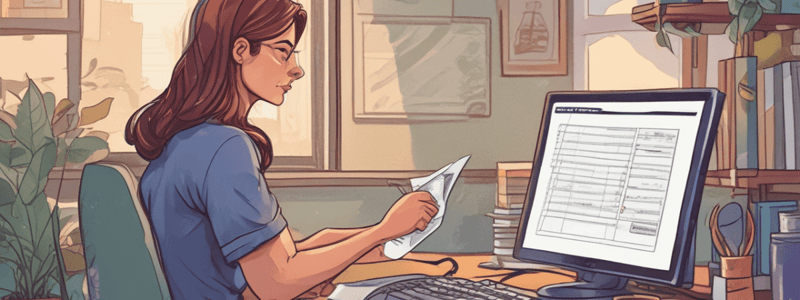Podcast
Questions and Answers
What percentage of a credit score is influenced by credit utilization?
What percentage of a credit score is influenced by credit utilization?
Which of the following is NOT a strategy for improving credit scores?
Which of the following is NOT a strategy for improving credit scores?
What is the primary purpose of checking credit reports?
What is the primary purpose of checking credit reports?
Which credit repair strategy involves paying off debt with the smallest balance first?
Which credit repair strategy involves paying off debt with the smallest balance first?
Signup and view all the answers
What is the recommended maximum credit utilization percentage?
What is the recommended maximum credit utilization percentage?
Signup and view all the answers
What is the main advantage of becoming an authorized user on someone else's credit account?
What is the main advantage of becoming an authorized user on someone else's credit account?
Signup and view all the answers
What percentage of a credit score is influenced by new credit?
What percentage of a credit score is influenced by new credit?
Signup and view all the answers
Which factor has the greatest influence on credit scores?
Which factor has the greatest influence on credit scores?
Signup and view all the answers
Study Notes
Credit Score Improvement
Understanding Credit Scores
- A credit score is a 3-digit number that represents an individual's creditworthiness
- Scores range from 300 to 850, with higher scores indicating better credit
- Credit scores are calculated based on information in credit reports, including payment history, credit utilization, credit age, and credit mix
Factors Affecting Credit Scores
- Payment history (35%): On-time payments, late payments, accounts sent to collections, and bankruptcies
- Credit utilization (30%): Amount of credit used compared to credit available
- Credit age (15%): Length of credit history and age of oldest account
- Credit mix (10%): Variety of credit types, including credit cards, loans, and mortgages
- New credit (10%): New accounts, inquiries, and credit applications
Improving Credit Scores
- Check credit reports: Obtain reports from all three major credit bureaus (Experian, TransUnion, Equifax) and dispute any errors
- Make on-time payments: Pay bills on time, every time, to demonstrate responsible payment behavior
- Reduce debt: Lower credit utilization by paying off debt and keeping credit card balances low
- Avoid new credit: Limit new credit applications and avoid applying for multiple credit cards or loans in a short period
- Monitor credit utilization: Keep credit utilization below 30% to avoid negatively impacting credit scores
- Avoid negative marks: Avoid collections, foreclosures, and bankruptcies, which can significantly lower credit scores
Credit Repair Strategies
- Debt snowball: Pay off debt with the smallest balance first, while making minimum payments on other debts
- Debt avalanche: Pay off debt with the highest interest rate first, while making minimum payments on other debts
- Credit builder loans: Take out a loan and repay it on time to build credit history
- Become an authorized user: Be added to someone else's credit account to benefit from their good credit habits
Credit Score Improvement
Understanding Credit Scores
- Credit scores are 3-digit numbers representing an individual's creditworthiness, ranging from 300 to 850
- Higher credit scores indicate better credit
- Credit scores are calculated based on payment history, credit utilization, credit age, and credit mix from credit reports
Factors Affecting Credit Scores
- Payment history accounts for 35% of credit score, including on-time payments, late payments, collections, and bankruptcies
- Credit utilization accounts for 30% of credit score, considering the amount of credit used compared to credit available
- Credit age accounts for 15% of credit score, considering the length of credit history and age of oldest account
- Credit mix accounts for 10% of credit score, considering the variety of credit types (credit cards, loans, mortgages)
- New credit accounts for 10% of credit score, considering new accounts, inquiries, and credit applications
Improving Credit Scores
- Obtain credit reports from all three major credit bureaus (Experian, TransUnion, Equifax) and dispute any errors
- Make on-time payments to demonstrate responsible payment behavior
- Reduce debt by paying off debt and keeping credit card balances low, lowering credit utilization
- Limit new credit applications and avoid applying for multiple credit cards or loans in a short period
- Keep credit utilization below 30% to avoid negatively impacting credit scores
- Avoid collections, foreclosures, and bankruptcies, which can significantly lower credit scores
Credit Repair Strategies
- Debt snowball: pay off debt with the smallest balance first, while making minimum payments on other debts
- Debt avalanche: pay off debt with the highest interest rate first, while making minimum payments on other debts
- Credit builder loans: take out a loan and repay it on time to build credit history
- Become an authorized user: be added to someone else's credit account to benefit from their good credit habits
Studying That Suits You
Use AI to generate personalized quizzes and flashcards to suit your learning preferences.
Description
Learn how credit scores are calculated and the factors that affect them, including payment history, credit utilization, credit age, and credit mix.




